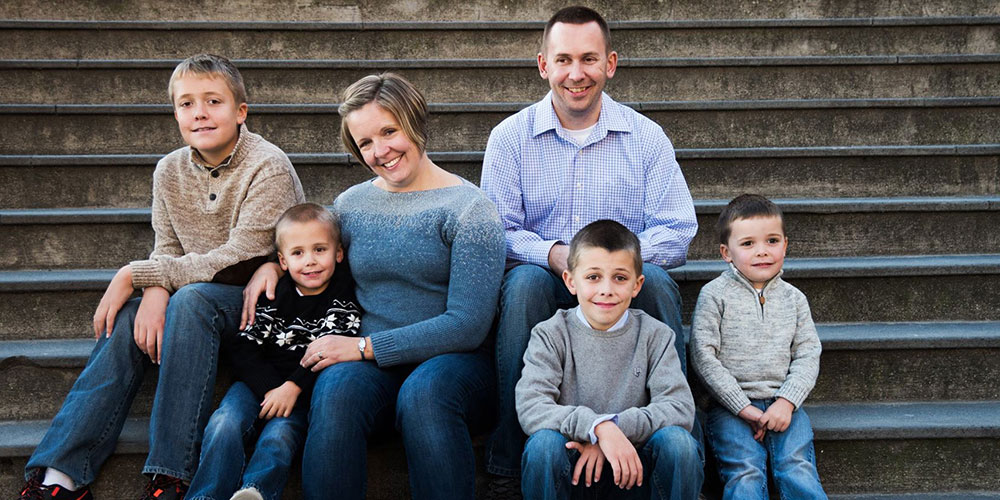Published: September 5, 2021

Blue Star Welcome Week Aims to Help #MilKids Find Connections After Each Move
When you think about the sacrifices military members make, your first thought might be of those on the frontlines―service members deployed overseas to defend and protect the freedoms we all enjoy. What most Americans don’t understand is that our military families are serving and sacrificing alongside their service members. Frequent moves, deployments, and long work hours make military life unpredictable. Military families are a strong and resilient bunch, but they need support from their neighbors, communities, and businesses.
According to the 2020 Military Family Lifestyle Survey, 79% of active-duty military families feel the general public is largely unaware of the daily challenges they face. The truth is that military life is challenging by nature and can feel really alienating. One of the major things fueling the feelings of isolation: frequent moves. You may be surprised to learn that 600,000 military-connected families move every single year. That’s a third of America’s All-Volunteer Force who are uprooting their lives and restarting at new duty stations, often far from any friends, family, or support system. Therefore, this annual movement places massive stress on the entire family unit. And when there’s stress on the service member, it jeopardizes their readiness and the military as a whole.
With four school-aged children, Erin, a Navy spouse, understands the stress of making sure military kids are happy and well-adjusted with each move. In the 18 years they’ve been a military family, Erin, her husband, and their boys have moved eight times and endured three deployments.
“Our boys are very resilient, and I believe that is primarily because of moving, but it can be hard on them,” Erin shared. “Most PCS [permanent change of station] moves happen in the summer, which can make the adjustments difficult. With school not yet in session and the summer heat keeping many families inside, it’s hard for our kids to find ways to meet friends and get connected, especially for my middle son, who is more of an introvert like me. Feeling at home, making important connections; the responsibility falls on us, but it also falls on our neighbors. If they don’t introduce themselves, it can make us feel really separated and unwelcome. And not just for myself and my husband, but for our kids, too, who are eager to find friends.”
Erin’s kids know how critical friendships are to making their experience in a new town and a new school enjoyable. At 16 years old, her oldest is currently attending his seventh school. “The most welcoming and inclusive location we’ve been to thus far was when we were overseas,” Erin recalled. “We lived on base, the kids went to school on base, and we were all in the exact same boat. Other locations we have lived in have been welcoming, but not nearly as much as that overseas experience. I know it’s different in civilian communities where families have been in one spot for a while; it’s not always on their radar to ‘adopt’ a new military family, but it makes such a huge difference for myself and the kids when you find someone willing to show you the ropes. Giving recommendations for schools, veterinarians, or even a place to take the boys to get their hair cut. It makes a huge difference in feeling like we belong.”
The concept of belonging is something we focus on a lot here at Blue Star Families. Sadly, in response to the 2020 Military Family Lifestyle Survey, just 27% of active-duty military families report feeling a sense of belonging to their local civilian community. And we understand those who do have a sense of belonging are much more likely to thrive. Blue Star Families knew something had to be done to change the narrative and shine a light on the military community’s needs nationwide. What emerged was Blue Star Welcome Week. “Blue Star Welcome Week is an annual event, piloted and designed to welcome our military-connected families to their new communities,” said Kathy Roth-Douquet, Founder and CEO of Blue Star Families. “It’s an opportunity for communities across the country to open their arms to military families by inviting military and civilian members alike to participate in events, provide messages of support and appreciation, and simply engage with military members. Our goal is to ease the transition and create a great sense of belonging for military families in a big, meaningful way.”
Having just moved again this summer, Erin and her kids are hopeful their community will embrace Blue Star Welcome Week. “This most recent move has been the hardest on my oldest because he made good, solid friends through the band at our last duty station,” Erin shared. “My middle son is more of an introvert AND in middle school, which is difficult in its own regard. When you add the two things together, it can make for a difficult time making friends. They are resilient and they adapt. They understand why we are military even if they don’t always like it. But it’s definitely been harder now that they’re older. For my kids and for myself, I’m grateful to have Blue Star Families available to support us with initiatives like Blue Star Welcome Week. I hope our new neighbors have a willingness to get to know us and be friends even if we will only be here short term.”
This year, Blue Star Welcome Week will be celebrated from September 25th – October 3rd. We hope you’ll join us to honor the military families in your neighborhood. Participate in a local event, introduce yourself to your new neighbor, reach out and connect with us. It doesn’t take much to make a big difference for those who sacrifice so much in service to our great country. Learn more about ways you can get involved at www.bluestarwelcomeweek.org.
Posted In: Our Stories
